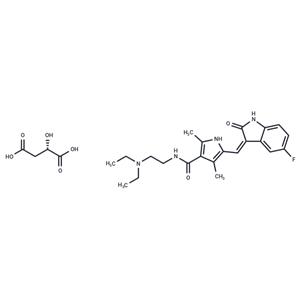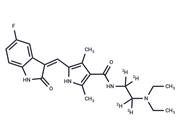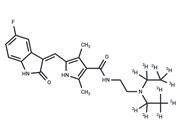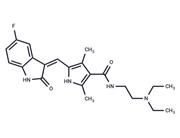| Name | Sunitinib Malate |
| Description | Sunitinib Malate (Sunitinib) is an indolinone-based tyrosine kinase inhibitor. It blocks the tyrosine kinase activities of VEGFR2, PDGFRβ (IC50: 80/2 nM), and c-kit. |
| Cell Research | RS4;11 and MV4;11 cell lines are starved overnight in medium containing 0.1% FBS prior to addition of Sunitinib (1-500 nM) and FL (50 ng/mL; FLT3-WT cells only). Proliferation is measured after 48 hours of culture using the Alamar Blue assay in triplicate for each condition, as described by the manufacturer. Trypan blue cell viability assays are performed in parallel and yielded similar results [3]. |
| Kinase Assay | Ki values for Sunitinib against Flk-1, PDGFRβ, and FGFR1 are determined using glutathione S-transferase-fusion proteins containing the complete cytoplasmic domain of the RTK. Cellular assays to directly determine the ability of Sunitinib to inhibit ligand-dependent RTK phosphorylation or cell proliferation and mitogenic responses are performed using serum-starved cells stimulated with 40 ng/mL VEGF165 (Flk-1/KDR), 0.5 μg/mL basic FGF (FGFR), or 50 ng/mL PDGF-AA (PDGFRα) or PDGF-BB (PDGFRβ) [2]. |
| Animal Research | Female nu/nu mice (8-12 weeks old, 25 g) are used. Briefly, 3-5×106 tumor cells are implanted s.c. into the hind flank region of mice on day 0. Daily treatment of tumor-bearing mice with oral administration of SU11248 as a carboxymethyl cellulose suspension or as citrate buffered (pH 3.5) solution is initiated once the tumors reached the indicated average size. Tumor growth is evaluated based on the twice-weekly measurement of tumor volume. Typically, studies are terminated when tumors in vehicle-treated animals reach an average size of 1000 mm3 or when the tumors are judged to adversely affect the well being of the animals [2]. |
| In vitro | Sunitinib is also a good inhibitor of KIT and FLT-3 [1]. In biochemical assays, Sunitinib exhibits competitive inhibition (with regard to ATP) against Flk-1 and PDGFRβ with Ki values of 9 nM and 8 nM, respectively. Sunitinib is also a competitive, albeit less potent, an inhibitor of FGFR1 tyrosine kinase activity, with a Ki value of 0.83 μM. In these biochemical assays, the IC50 values for Sunitinib are generally at least 10-fold higher than those for Flk-1 and PDGFR (e.g., IC50s: >10 μM for EGFR and Cdk2; 4 μM for Met; 2.4 μM for IGFR-1; 0.8 μM for Abl; 0.6 μM for Src) [2]. In RS4;11 cells (FLT3-WT), treatment with Sunitinib inhibits FLT3-WT phosphorylation in a dose-dependent manner with IC50 of approximately 250 nM. In MV4;11 cells that express FLT3-ITD, Sunitinib inhibits FLT3-ITD phosphorylation in a dose-dependent manner with an IC50 of 50 nM following a 2-hour treatment [3]. |
| In vivo | Sunitinib (80 mg/kg/day) inhibits the growth of established SF763T and Colo205 tumor xenografts in athymic mice. Sunitinib treatment effectively inhibits the growth of established tumor xenografts[2]. Sunitinib malate is an inhibitor of VEGFR, PDGFR, FGFR, and is used in the treatment of advanced renal cell carcinoma and gastrointestinal stromal tumors. Sunitinib malate-treated rats display much lower levels of tumor growth than untreated rats, and their tumors have much smaller necrotic areas and lower vascular density [4] |
| Storage | Powder: -20°C for 3 years | In solvent: -80°C for 1 year | Shipping with blue ice/Shipping at ambient temperature. |
| Solubility Information | H2O : 10 mg/mL (18.78 mM), Sonication is recommended.
DMSO : 6.25 mg/mL (11.74 mM), Sonication is recommended.
10% DMSO+40% PEG300+5% Tween 80+45% Saline : 1 mg/mL (1.88 mM), Sonication is recommended.
|
| Keywords | VEGFR2 | VEGFR | Vascular endothelial growth factor receptor | Sunitinib Malate | SU-11248 | SU11248 | Platelet-derived growth factor receptor | PDGFRβ | PDGFR | Mitophagy | Mitochondrial Autophagy | Kit | IRE1 | Inositol requiring enzyme 1 | Inhibitor | inhibit | FLT3 | cKit | Autophagy | Apoptosis |
| Inhibitors Related | Stavudine | Cysteamine hydrochloride | Sodium 4-phenylbutyrate | Hydroxychloroquine | Guanidine hydrochloride | Tributyrin | Paeonol | Naringin | L-Ascorbic acid sodium salt | Alginic acid | Gefitinib | Dextran sulfate sodium salt (MW 5000) |
| Related Compound Libraries | Bioactive Compound Library | Membrane Protein-targeted Compound Library | Kinase Inhibitor Library | Tyrosine Kinase Inhibitor Library | EMA Approved Drug Library | Anti-Cancer Clinical Compound Library | Drug Repurposing Compound Library | Inhibitor Library | FDA-Approved Drug Library | Anti-Aging Compound Library | Bioactive Compounds Library Max | Anti-Cancer Drug Library |

 United States
United States






